 Fr Z reports
Fr Z reports that a Catholic candidate for the Republican presidential nomination, Rick Santorum, has publicly disagreed with the US Conference of bishops, on the subject of immigration. The bishops suggested that, to deal with the huge pool of illegal immigrants already in the United States, they be given the right to stay if they remained in the country for a certain number of years.
“If we develop the program like the Catholic bishops suggested we would be creating a huge magnet for people to come in and break the law some more, we’d be inviting people to cross this border, come into this country
and with the expectation that they will be able to stay here
permanently,” said Santorum..."

It reminded me of a British politician, John Gummer MP (as he was: he's now Lord Deben), a few years ago. In a speach in the House of Commons in February 2007,
he said
"I want to give one example [sc of discrimination] because I happen to disagree with my Church
on it, so it is a good example to use. I think that it is right to
remove the discrimination against same-sex couples in relation to
adoption, but I also think that we should be tolerant of people who do
not agree with that."
Gummer had become a Catholic in 1992.
I suppose Tablet-type Catholics would say that they were both entitled to say what they liked, regardless of what their bishops had said on the matter. Left-leaning Catholic liberals (not all liberal Catholics are on the political left) can be surprisingly assertive about the need for other people (not themselves) to obey ecclesiastical pronouncements they happen to like, but this is just tactical. The fundamental view is that if you believe something, it is a matter of conscience; if it is a matter of conscience, then it would wrong for you to act against what you believe. It follows from this facile syllogism that the teaching of the Church should never be followed by anyone on pain of sin, unless by someone who by sheer coincidence happened to agree with it already.
Ultramontanist Catholics would say that both are wrong: the classic proposition of ultramontanism is that the whole gamut of offical teaching is binding on the Catholic, and in both cases we have bishops exercising their teaching office on a matter of public morality, or at least appearing to do so. In each case it is a matter not of doctrine narrowly defined, but of the practical moral implications of doctrine, but if you don't allow bishops (and the Pope) to set out such practical moral implications in an authoritative way then the doctrines will be useless verbal formulae.
A lot of conservative Catholics are attracted by ultramontanism today, in reaction to liberalism. Both positions are mistaken, however. Against liberalism, the point of authoritative teaching is bringing people the light of the Gospel, so that where people once believed the wrong thing, they start believing the right thing. The Church can do this because her teaching is guaranteed by the Holy Spirit, and the people are rationally justified in accepting the teaching because they recognise in the Church the voice of Our Lord. In all sorts of ways the Church's authority can be perceived by people of good will: they can see her power to transform lives and make saints, for example; they see supernatural signs accompanying her activity, and they see the intellectual power and coherence of the teaching itself.
Against ultramontanism, the Church distinguishes between binding and non-binding pronouncements with great care, and this distinction is part of her teaching: to ignore it in order to adhere to that teaching more closely is self-defeating. On matters of historical or scientific fact not directly connected with the deposit of Faith, the Church exercises extreme caution: we are never obliged to believe the truth of private revelations, for example. Again, the moral urgency of a bad situation is for bishops and the Pope to point out: the remedy may be obvious (like feeding some starving people), or it may require complex judgements based on human learning and expertise. In the latter case, it is a matters of prudential judgement, and here there is room for legitimate disagreement.
As Fr Z suggests, however much we may disagree with Santorum on his favoured immigration policy (whatever it is), it is hard to deny that exactly what policy will most help actual and potential immigrants and their hosts is a matter of prudential judgement. Economic and political judgement comes into play. Well-meaning policies can be counter-productive.
Gummer/ Lord Deben is on thinner ice. While there are prudential judgements at issue in placing children with adoptive parents, the idea that is a matter of justice, of non-discrimination, that those in civil partnerships be allowed to adopt, is (as the Bishops of England and Wales had pointed out) incompatible with the obligation of adoption agencies to place children in the best possible family. It is also at right-angles to fundamental Catholic teaching on the nature of the family. Again, the very notion of civil partnerships as a quasi-family unit involves the legal recognition of a sexual relationship incompatible with Natural Law. In speaking as he did, Gummer demonstrated a refusal to be docile to a whole raft of Catholic teachings, not as applied to an individual, tricky, practical case, but in principle.
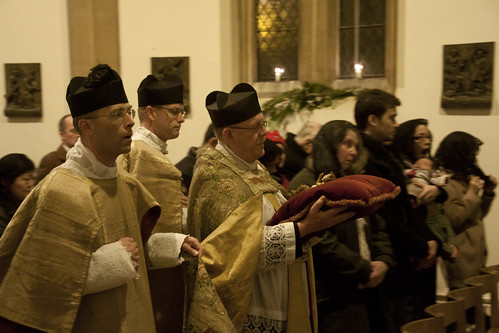


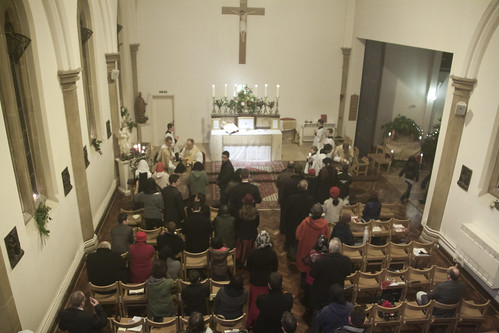
 The verb fremo suggests roaring and growling as well as rage. The birth of Our Lord was not met with universal rejoicing. Good people rejoiced. The wicked were besides themselves with rage.
In the Gospel story the wicked have their representative in Herod. But this is a cosmic thing. The same contrasting reactions will be on display when Our Lord comes the second time. The good will rejoice. The wicked will feel very differently. The events which bring God into the world are divisive (Matthew 10.34.)
The verb fremo suggests roaring and growling as well as rage. The birth of Our Lord was not met with universal rejoicing. Good people rejoiced. The wicked were besides themselves with rage.
In the Gospel story the wicked have their representative in Herod. But this is a cosmic thing. The same contrasting reactions will be on display when Our Lord comes the second time. The good will rejoice. The wicked will feel very differently. The events which bring God into the world are divisive (Matthew 10.34.) Fr Ray Blake's encounter with a green-ink correspondant, about his extremely cautious experiment with saying Mass ad orientem, illustrates the point I made in this post perfectly: it is usually easier for a priest concerned about increasing the sacrality of parish liturgy to introduce a new Mass in the Extraordinary Form, or even to make one of his existing Masses an EF one, than to raise the standard of the existing Masses along 'Reform of the Reform' lines.
Fr Ray Blake's encounter with a green-ink correspondant, about his extremely cautious experiment with saying Mass ad orientem, illustrates the point I made in this post perfectly: it is usually easier for a priest concerned about increasing the sacrality of parish liturgy to introduce a new Mass in the Extraordinary Form, or even to make one of his existing Masses an EF one, than to raise the standard of the existing Masses along 'Reform of the Reform' lines.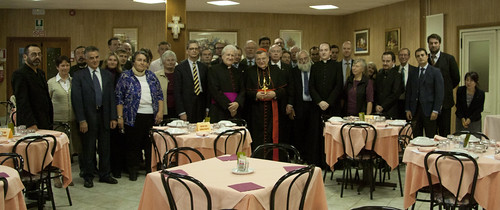
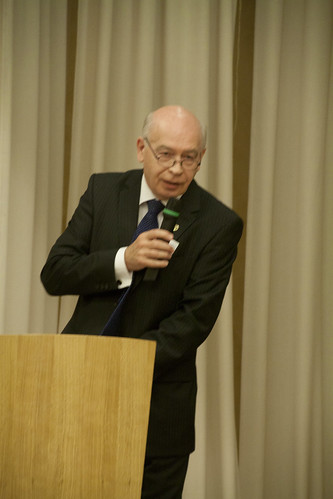
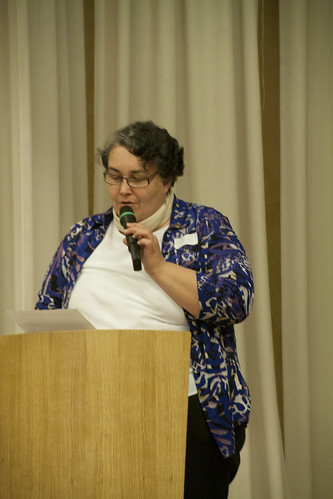
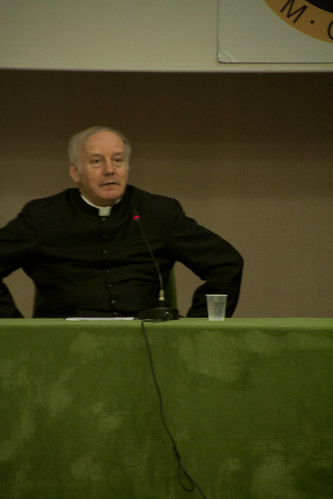
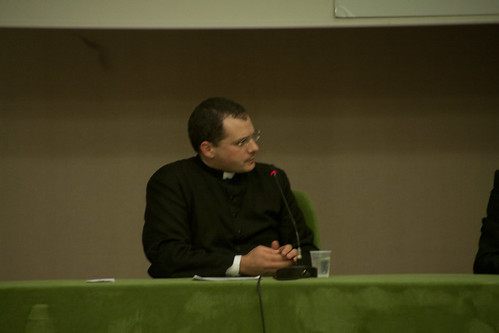
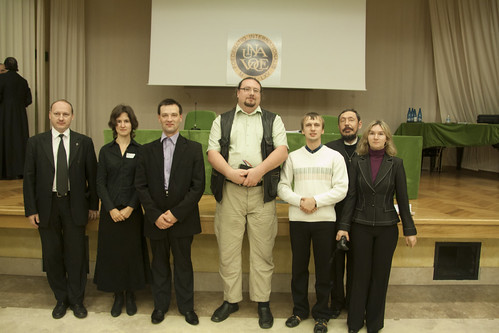
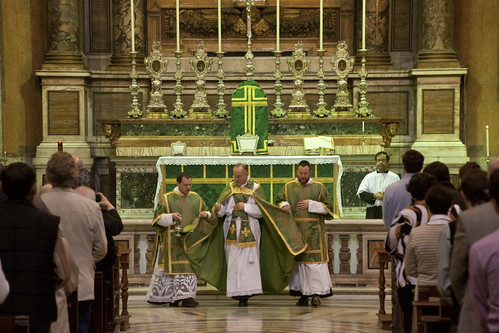
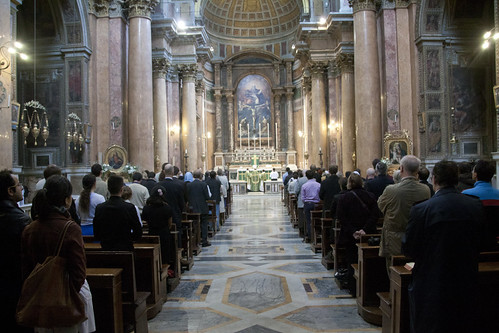
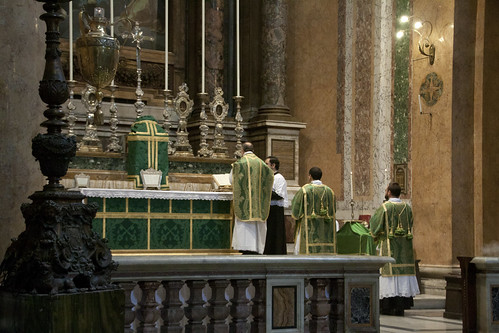
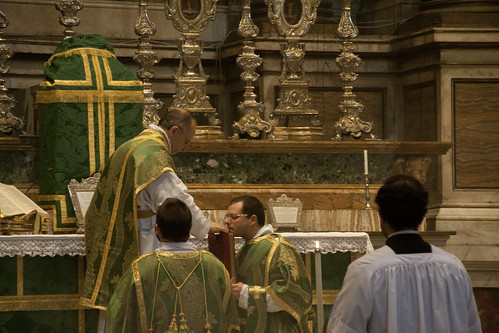
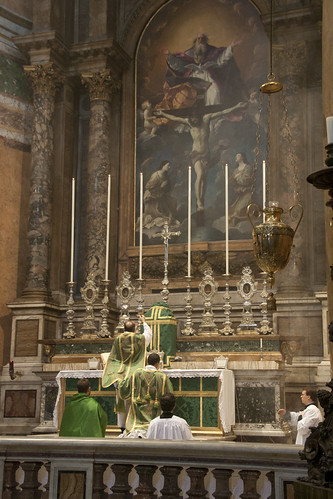
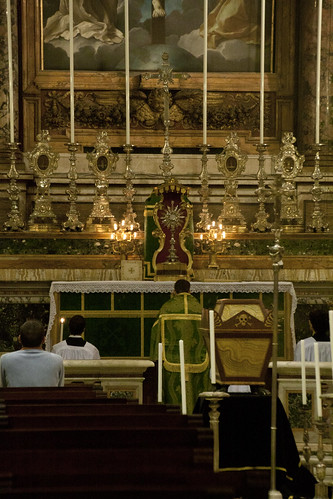
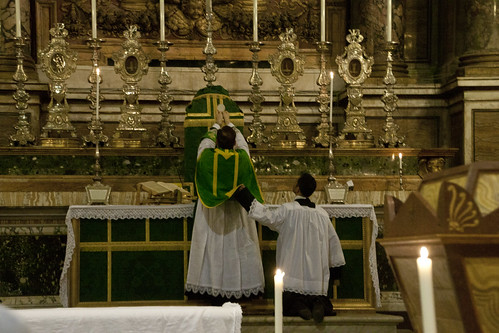
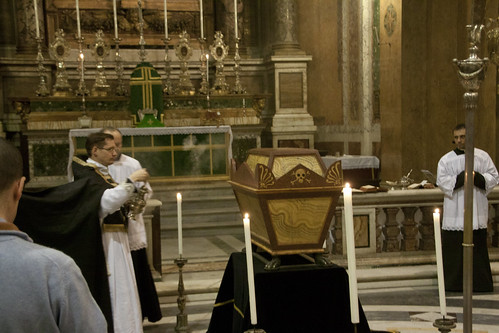 More photos of the Low Mass here.
More photos of the Low Mass here.

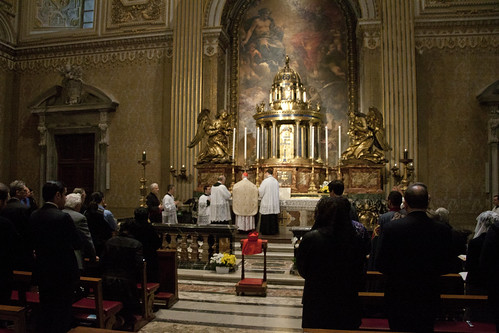
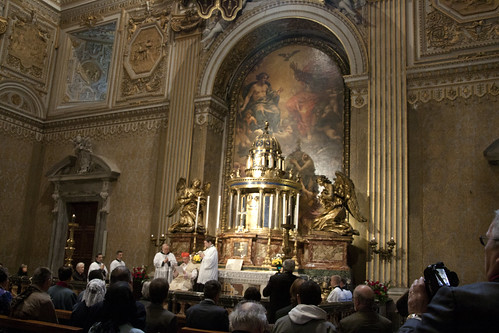
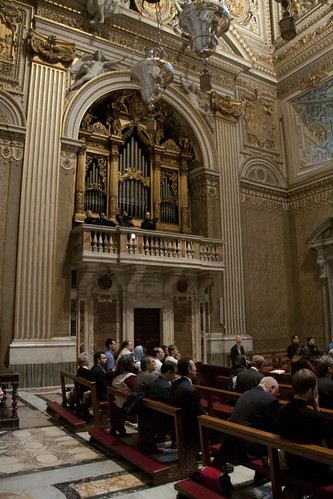
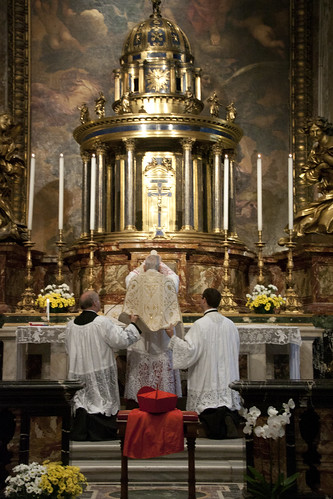
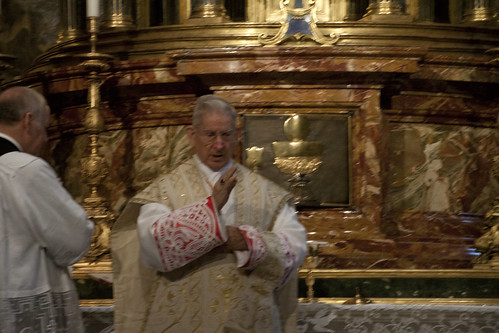
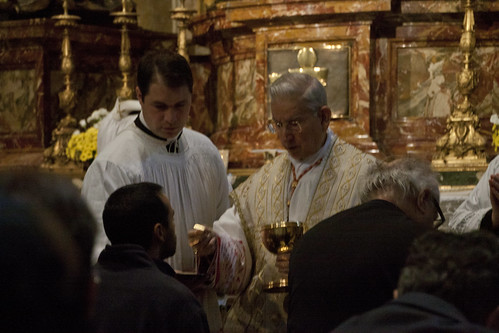

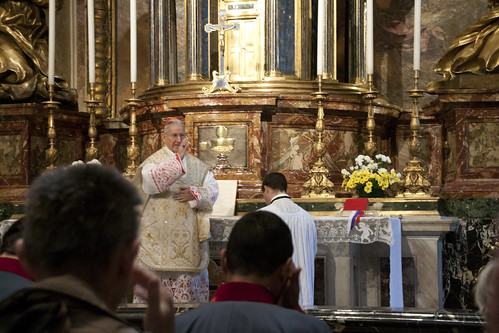
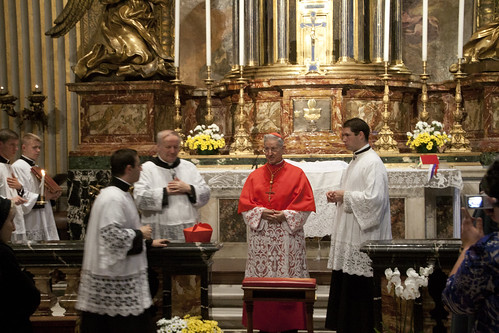
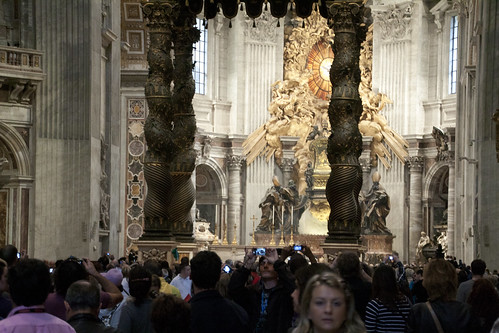
 Fr Z reports that a Catholic candidate for the Republican presidential nomination, Rick Santorum, has publicly disagreed with the US Conference of bishops, on the subject of immigration. The bishops suggested that, to deal with the huge pool of illegal immigrants already in the United States, they be given the right to stay if they remained in the country for a certain number of years.
Fr Z reports that a Catholic candidate for the Republican presidential nomination, Rick Santorum, has publicly disagreed with the US Conference of bishops, on the subject of immigration. The bishops suggested that, to deal with the huge pool of illegal immigrants already in the United States, they be given the right to stay if they remained in the country for a certain number of years.  It reminded me of a British politician, John Gummer MP (as he was: he's now Lord Deben), a few years ago. In a speach in the House of Commons in February 2007, he said
It reminded me of a British politician, John Gummer MP (as he was: he's now Lord Deben), a few years ago. In a speach in the House of Commons in February 2007, he said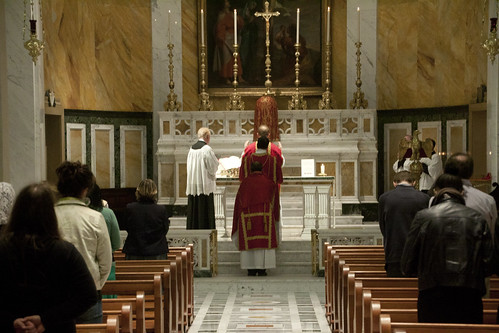
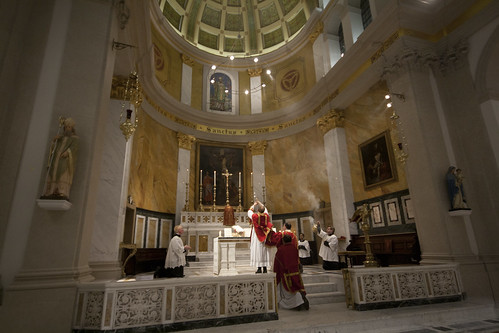
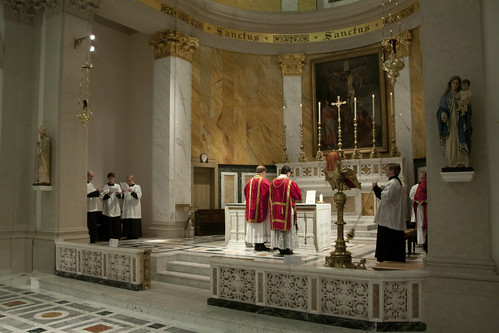

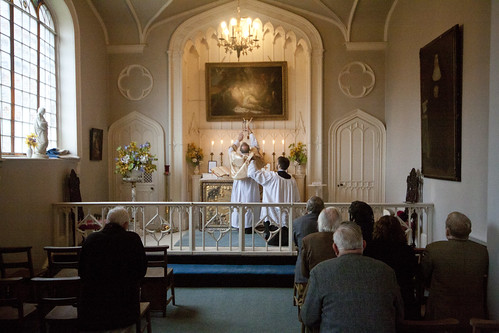 Due to problems with my PC over the course of the last few weeks I have a backlog of photographs to post. The annual Mass in Mapledurham took place on 26th November.
Due to problems with my PC over the course of the last few weeks I have a backlog of photographs to post. The annual Mass in Mapledurham took place on 26th November.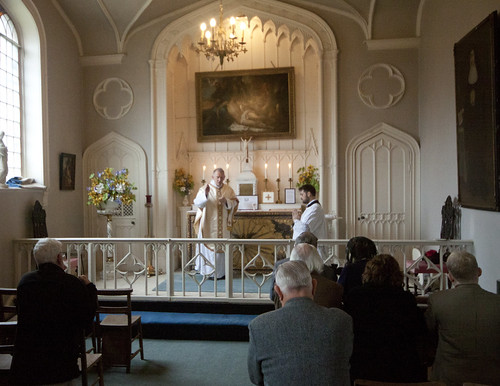
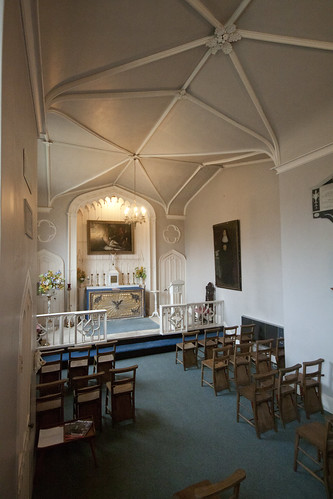

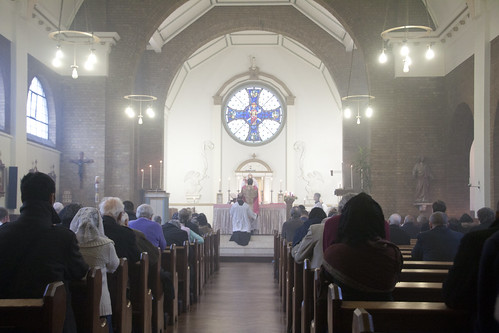
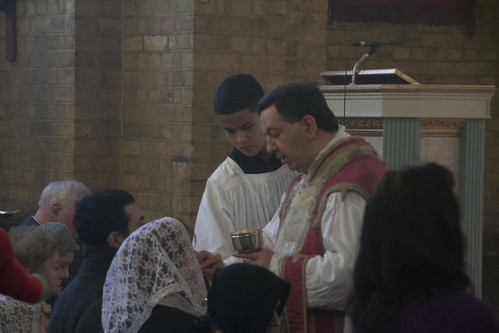
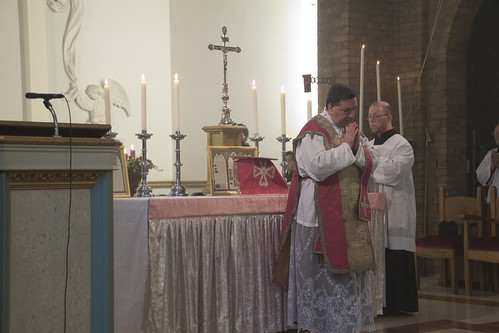 The Mass was accompanied as usual by the Cantores Missae, directed by Charles Finch, who sang Mass in honour of Our Lady of Loreto by Vinzenz Goller,
Ave Maria by Vinzenz Goller,
Ave verum by W.A. Mozart, and
Alma redemptoris mater by G.P. da Palestrin.
The Mass was accompanied as usual by the Cantores Missae, directed by Charles Finch, who sang Mass in honour of Our Lady of Loreto by Vinzenz Goller,
Ave Maria by Vinzenz Goller,
Ave verum by W.A. Mozart, and
Alma redemptoris mater by G.P. da Palestrin.